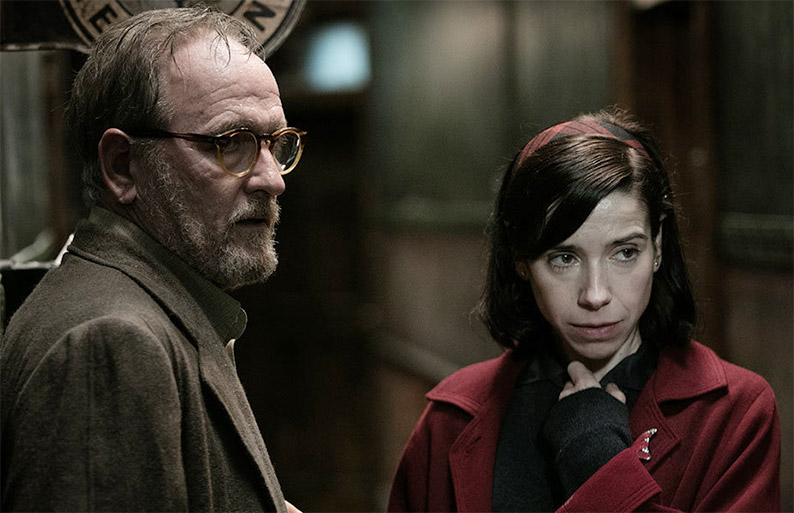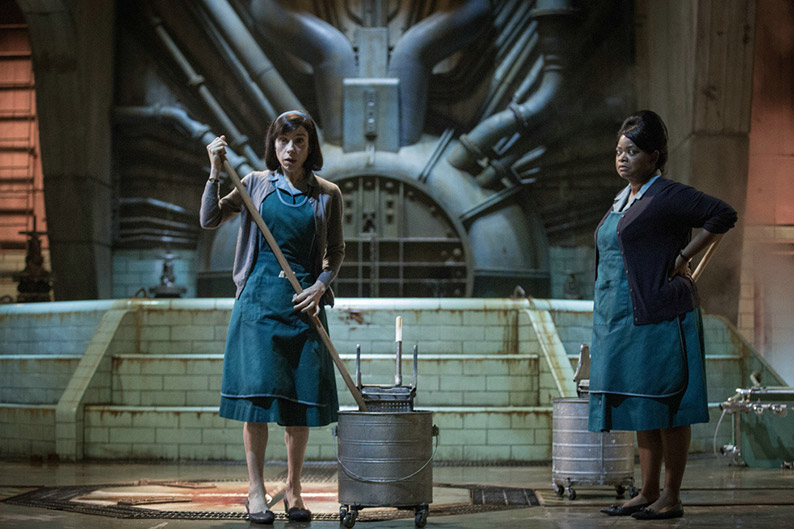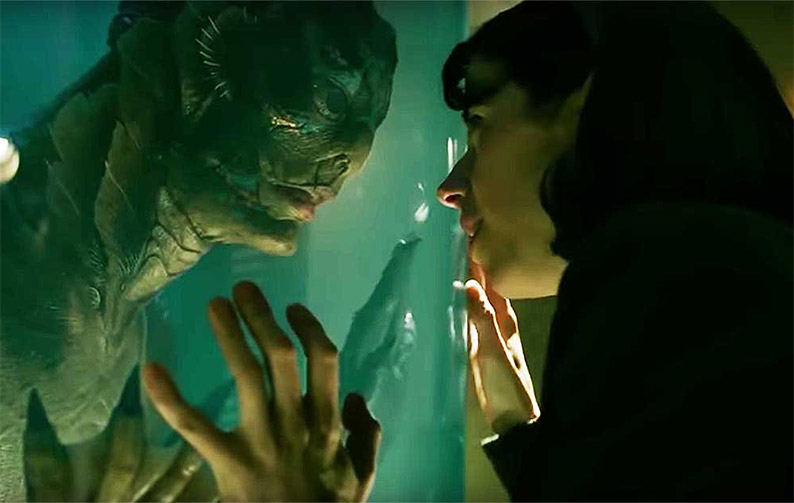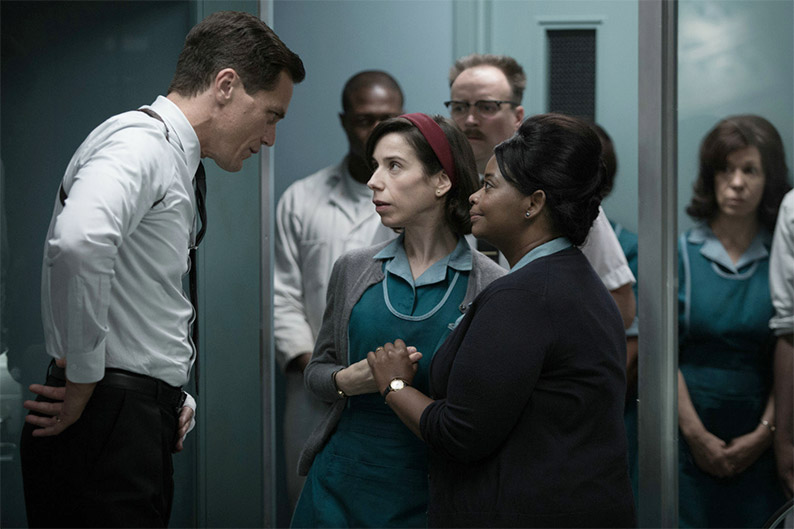| |
'I saw her, the way she looked, and I thought, “She’s perfect,” because most people think actors deliver great lines and they deliver dramatic stuff but in reality for me, an actor listens and looks, and when they listen to another actor and look at another actor, that’s the most value resource in an actor. So I wrote it for her, speechless, mute, because to me, love renders you speechless. And it was not about what they said to each other but how they recognised each other.' |
| |
Director del Toro on leading lady Sally Hawkins* |
If The Shape of the Water is anything, it's a love letter, unashamedly and unapologetically sincere, to old Hollywood encompassing the soaring need for reciprocal love when all around you is a terrifying maelstrom of duplicity and immorality spinning madly beyond anyone's control. A lot like 2018 then. To del Toro as to his Elisa Esposito, the mute leading character, what you may love may be seen as unlovable and even detestable to some. The director's younger self found emotional solace in the Hollywood monster. Scary yes, but in them, the outsiders, he found amplified human attributes, some more acceptable to an imaginative boy than the adults that seemed to control his fate. In today's world, it has been remarked that del Toro's charming fantasy is a clarion call for tolerance and acceptance of the 'other' at a time when the 'other' is feared and legislated against all over the so called 'first', civilised world. If the film's fantasy meshed with the even significantly less believable fantasy of Trump's presidency, he'd be advocating building a giant net... Idiot. I just finished reading Fire and Fury, Trumpocracy and Collusion in succession. If a tenth of either tome is true, justice is on its way, folks.

As regular readers may now be bored by my enthusiasm for Sally Hawkins, I invite them to skip this paragraph. It doesn't seem to matter what genre, what role, what scenes she plays in, Sally Hawkins is always there on screen, utterly believable, in the moment and enveloping her audience in the dream in which she is performing. I use the word 'authentic' a great deal to praise how actors do their thing but Sally Hawkins has yet to deliver a performance that is not palpably real, emotionally searing and just simply true. There was a moment when (underwater by coincidence) she is trying to save Paddington bear trapped in a train car in last year's sequel. Here's her gift... I knew Paddington wasn't going to die, but she didn't and she showed us this in her eyes. To her, she was not strong enough to help, and this gentle, loving soul was about to die in front of her. Give that moment to Sally Hawkins and despite the concrete fact that the bear will be rescued, there's a bloody lump in your throat. How does she do that? Godzilla was an exception as she had very little to do – I suspect Gareth Edwards just wanted to work with her and who could blame him? This emotional authenticity is all the more important in an out and out fable or fantasy. She and her magnificent fellow cast members don't put a foot, webbed or otherwise, wrong and given the nature of the film, I find it notable that she gives del Toro her all including total nudity that would scare off many actors convinced they'd have to save that part of their acting repertoire for a movie more worthy than a reworking of The Creature from the Black Lagoon. In 'real' life Hawkins is apparently painfully shy. As a selfless actress, she's anything but. Now, you'd have to be a real cynic to suggest that the nudity was not Hawkins' own but some seamlessly crafted 'Cersei shamed naked' Game of Thrones body replacement CGI. I am not a cynic to my knowledge. Not only does Hawkins go to those vulnerable places without qualm, she delivers such a beguiling performance even when matter-of-factly pleasuring herself in a morning bath routine beautifully cut together with no small rhythmic glee by Sidney Wolinsky. The worship of Ms. Hawkins for the purposes of this review concludes here. Be warned, there may be further fawning but it won't be intentional.
There is a distinct aural Amélie vibe being given off as we drift through an apartment presented dreamlike, underwater as Elisa drifts down towards her bed. This vibe is given further credence by the jaunty merry-go-round and harp-plucked opening cue with a few accordion parts nestled in composed by Alexandre Desplat. Water just cannot get away from the harp not that this is any form of criticism. There are distinct moments in the score that echo the lushness of Bernard Herrmann's Vertigo score. Desplat's work is first-rate (I'm listening to a loop of the score as I write) and complements del Toro's visuals beautifully but any accordion is always going to take me straight to Paris and cracked crème brûlées, damn it. In one of the more shocking aspects of the making of the movie, director del Toro admits in a Sight and Sound interview this month (a masterclass culled from his appearance at the Morelia Film Festival) that "I don't usually go to the music recordings. But Desplat told me I had to go." My jaw dropped reading that. As a filmmaker, it is one of the most rewarding tasks a director can have, working closely with a composer whose score is going to tease emotions from the audience. This lack of interest in the physical recordings implies either del Toro is so satisfied with the temp sampled examples or that his trust in his composer is dangerously absolute.

Seeing footage of M. Night Shyamalan working with James Newton Howard shows just how much a director can tweak even existing music already creatively signed off by the director. The creative process is a never-ending one in which the work is always abandoned by those who bring it into being. I find it amusing that Desplat said that the music "...had to flow like water," which inadvertently references the name of the one of the most emotional and powerful cues ever written for cinema by a living composer, Flow Like Water by James Newton Howard. Pity it's buried in a mediocre movie. You Tube it, turn the lights out and crank the volume up. If you are not a tear stained mess after its six minute, thirty-five second running time then there's no more hope left in the world! To give credit, del Toro concludes on the subject of music and I quote "And it was wonderful to be there. I understood how to express myself at fiftysomething years of age and it changed my life."
Go, Guillermo!
Plot-wise, the film breaks no really new ground but riffs subversively on genre staples. It's the early sixties and the start of the Space Race and the middle of the Cold War. A mute woman with scars on her neck and an eyebrow raising morning ritual (no, not the number of boiled eggs) works at a secret facility where reactions to global mistrust and hostility are prompting all sorts of nasty experiments. She's a mere cleaner so has access to sensitive locations because even sensitive locations have to be cleaned. At work, her friend Zelda (Hidden Figures' Octavia Spencer delivering a wonderfully warm and forgiving turn as Elisa's best friend) translates and covers for her as Elisa signs her way through her mundane duties. But then, one day (one is tempted to say 'Once Upon A Time...') a coffin-like container of water is delivered. A webbed and distinctly inhuman hand responds to Elisa's enquiring touch. This is the 'asset', an aquatic humanoid creature captured from an Amazonian river. Elisa is intrigued and later horrified to find out that this creature is being tortured by Richard Strickland (we'll come to him in a minute) for reasons of control (one assumes) and the asset's value to the Space Race. Nope, me neither. After one violent mistreatment too many, Elisa decides to spring the creature and give it its freedom. But the Russians are involved (where have I heard that before?) and things have to get worse before they end "happily ever after..."

Crucial to the success of the film is the amphibian leading man's believability. After several viewings of the film and the close scrutiny of the piece on the film by Cinefex – the best periodical out there if you really want to know how things were actually done – I am gobsmacked anew. The principal special effect (aside from Doug Jones' remarkable physicality) was the amphibian suit lovingly created and maintained by Legacy FX. When the creature had to do things that Jones was unable to perform on camera, hello Mr. X's (the visual FX company) digital double. The shot that completely fooled me and illustrated FX work that astounds is the shot of the amphibian breathing algae water through his gills in Elisa's bathtub. The shots before are of Jones in full suit adjusting to the new environment and in some pain because he needs salt to process the water. There's a small suspenseful moment after the salt goes in and then the big breath is taken. From Elisa's relief we cut to not only a digital double of the character breathing water through its gills but all the bloody water was digital too. Modern cinema effects when blended with appropriate effect for appropriate situation can be so seamless which helps with the suspension of disbelief. I am in no small awe at what these artists can create. Kudos to both Legacy and Mr X for working so well together.
A favourite of mine and I suspect of many more, Richard Jenkins, plays the one of only two friends Elisa has in the world, Giles, her next-door neighbour. Gay and playfully hair – and hair piece – obsessed, he's an advertising artist who's currently between projects and somewhat desperate because of these circumstances. It's his character that probably represents the audience's point of view more than anyone else's. His is the voice of sanity in a world that embraces chaos. Probably most famous for his recurring role in Six Feet Under despite his character's death in the first episode, Jenkins has popped up in a great many TV and movie projects (I will always have a soft spot for him as Sitterson in Cabin in the Woods). His sympathetic portrayal of Elisa's neighbour creates some lovely connections, if fleeting. The two on the sofa performing their version of the stair dance, while sat, is a little precious moment in a film with quite a few to choose from. Currently lending his remarkably slender frame to Star Trek Discovery as the alien Saru, del Toro regular Doug Jones inhabits the creature suit with his usual grace. I'm sure there are a few computer generated additions to the aquatic creature but Jones must take most of the credit for the leading man's performance. I was startled to learn that the thin man is older than I am (can it be true?) At fifty-seven, he managed to portray a seemingly supernatural being with vigour and youthful sexuality. Nice one, Doug. Let's not forget his role as the unforgettable lead 'Gentleman' in one of Buffy's greatest episodes, Hush.

Now, I really like Michael Shannon. Isn't it frustrating that I have to say that up front as I pinpoint a problem I had with his character? I particularly like his political views and his rather radical idea that America needs to be divided between the dumb and not so dumb: The Dis-united States of America.** But regardless of the fact that his face at rest screams hard ass villainy – and boy, has this man been typecast – I would have preferred a little more light and shade in Water's real monster, Colonel Richard Strickland. Del Toro (are you allowed to capitalise a lowercase name?) suggests that the actor reveals his character's vulnerability in stages throughout the movie. If this is true, it's subtle to the point of virtual invisibility. Yes, he has problems, mostly with his gangrenous fingers. But his subordinate nature to his commander isn't enough for me to see chinks in his sadistic armour. Shannon plays Strickland as a bastard to end all bastards. I'm not going to say one-note, one hundred per cent sadist but if there is room to manoeuvre, it's one note ninety per cent sadist. Let's not forget his clumsy but threatening Weinstein at Elisa. God, it's a verb now? He uses his electric stick almost randomly and I was never clear what he wanted from the creature that he had to keep electrocuting it. Secret plans? Obedience? Moisturising tips? It just seemed like Strickland was having fun. It's also hard for me not to see his choice of vehicle (a green Cadillac) as an ironic dig at film grading these days. "Teal," he says (the colour that makes skin tones jump out apparently). Shannon is convincing but as Sight and Sound said in its own review by Kim Newman, it was the extreme nature of this character that clues you in that you are watching a romantic fable or fantasy. He simply has to be that bad.
Now if you take this on board you should be prepared for anything but the best fables and fantasies should still adhere to established rules. Late in the day about two thirds of the running time, we discover our aquatic Romeo has a gift, a gift it may have been prudent to utilise a lot earlier on. There is also a moment at the ending that may have been foreshadowed well enough but as it appears obvious to other reviewers in other reviews, I will just admit that I missed it. I have been somewhat misleading in this review and for that I belatedly apologise. I first saw The Shape of Water and was somewhat underwhelmed emotionally despite the world-class display of craft on offer. Given the pedigree of the creative participants I had expected to be like an unlucky skittle fulfilling my destiny – utterly bowled over. But I wasn't. It was like every Pan's Labyrinth, The Devil's Backbone and Crimson Peak had led me gently to this new very personal offering and at the close I felt a small fraction of the emotion I thought I would experience. This, I must hammer home, is a deficiency in me not the movie. I got so much more out of the film the second time around (the 'ruby slippers' is an exquisite touch). The black and white fantasy of the creature and Elisa dancing to her voiced rendition of You'll Never Know could not but remind me of my favourite scene in Scorsese's Alice Doesn't Live Here Anymore, a scene I wore out on VHS by playing it over and over...
The Shape of Water has moved audiences the world over and as a work of very personal art I have to champion it albeit from the perspective of someone not moved by it as much as I desperately desired to be. Expectation kills cinema, my own fault. See it for its stark beauty, its much-needed message of societal inclusion and some of the finest performances in the all-star line up for this season's gongs. I adore Sally Hawkins. Did I get away with that?
|